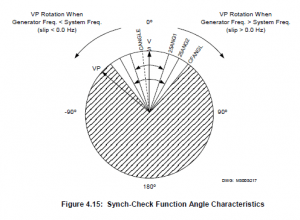No products in the cart.
Real World Problem With an SEL-300G Synch-Check
Here is a story from one of our Customers at Manta Test Systems:
“I had to troubleshoot a Schweitzer SEL-300G relay yesterday that had the (25) Sync-Check element enabled, but wouldn’t assert the close permissive. My customer had had extreme problems synchronizing the 16MW generator on-line. They sometimes had to try up to 10 times to close the generator breaker, and without success. And, as you know, steam turbines don’t like to spin unloaded; they overheat, etc. The Substation was rebuilt in 2009, and all relays were upgraded to SELs; hence, the problem has existed since then—and I just learned of it!
Thanks to the MTS-5000, I discovered the problem. The SEL-300G, actually all SEL relays configured with Sync-Check, must be connected with the generator voltage (SYNCP) on terminals Z09-Z10-Z11-Z12, and the System voltage (VS) on terminals Z15 & Z16. Regardless of the Synchronizing settings, the close permissive contact(s) (25A1 and/or25A2) will only assert if the generator frequency is above 60 Hz, or more correctly stated, faster than the System voltage. I found the voltage connections reversed! SYNCP was actually connected to the Bus Voltage & VS was actually connected to a PT on the generator leads.
I thought you may have already run into this situation, or may in the future. If so, you are now armed with the ultimate knowledge for sync problems with SEL relays.”

Did you like this post?
You can share it with these links:
Read More Articles:
SEL Test Procedure Negative-Sequence Volt-Pol Directional Overcurrent Element
